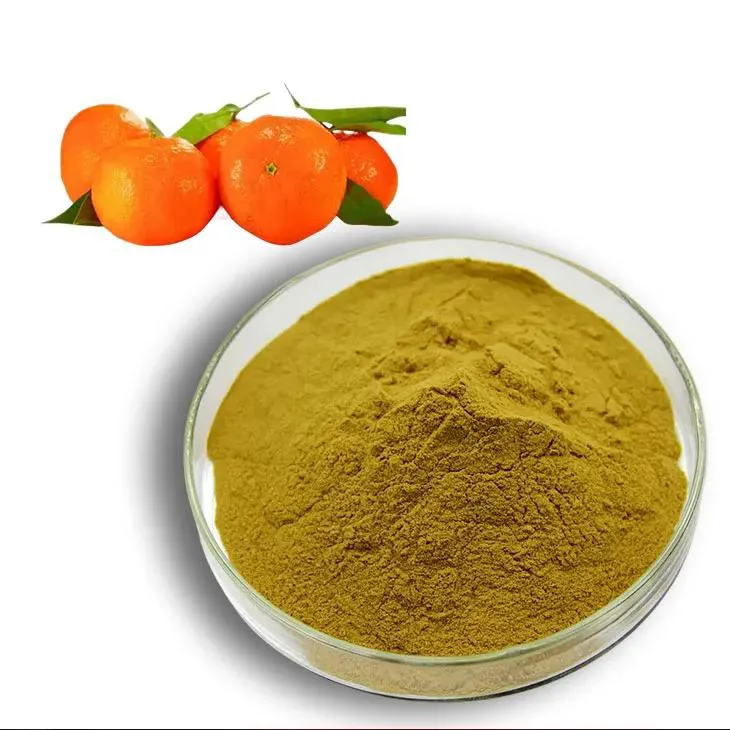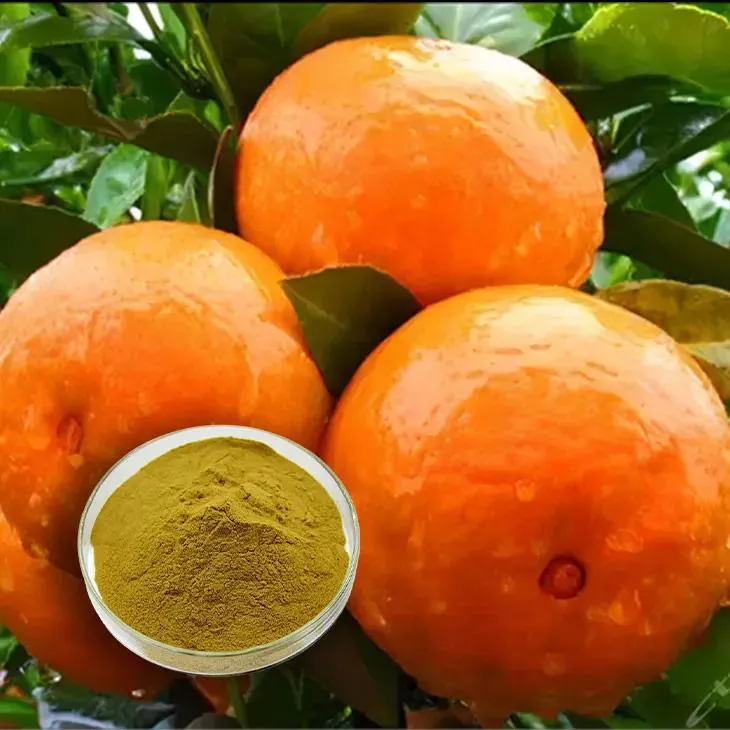- 0086-571-85302990
- sales@greenskybio.com
Citrus Bioflavonoids in Weight Loss: A Comprehensive Analysis
2025-06-20

In the quest for healthy weight management, individuals frequently seek alternative approaches that complement a balanced diet and active lifestyle. Citrus bioflavonoids, a group of plant compounds found in abundance in citrus fruits such as oranges, grapefruits, lemons, and limes, have gained attention for their potential health benefits. Among these benefits, their role in weight loss has become a topic of interest within the scientific community and among consumers. This article aims to explore the potential of Citrus bioflavonoids in aiding weight loss, examining existing research, mechanisms of action, and considerations for incorporation into a weight management regimen.
Understanding Citrus bioflavonoids
Citrus bioflavonoids are polyphenolic compounds responsible for the vibrant colors and rich flavors of citrus fruits. They encompass a variety of individual compounds, including Hesperidin, naringin, Quercetin, and rutin. These bioflavonoids are celebrated for their potent antioxidant and anti-inflammatory properties, making them potentially valuable allies in promoting overall health.
Their antioxidant capacity helps combat oxidative stress, reducing the damage caused by free radicals, which can contribute to a range of chronic diseases. Additionally, due to their anti-inflammatory effects, citrus bioflavonoids hold the potential to positively impact conditions associated with chronic inflammation, such as obesity.

Mechanisms of Citrus Bioflavonoids in Weight Management
To understand the potential role of citrus bioflavonoids in weight loss, it is essential to explore the mechanisms by which these compounds may influence body weight and metabolism:
1. Metabolic Enhancement: Studies indicate that certain citrus bioflavonoids can enhance metabolic rate, leading to increased energy expenditure. By promoting thermogenesis—the process by which the body generates heat—bioflavonoids may help increase calorie burning.
2. Fat Breakdown and Inhibition: Citrus bioflavonoids have been studied for their ability to influence lipid metabolism. They may promote the breakdown of fats (lipolysis) and inhibit the formation of new fat cells. Compounds like naringin have been shown to modulate enzymes involved in fat metabolism, potentially reducing fat accumulation.
3. Appetite Regulation: Some research suggests that citrus bioflavonoids might play a role in appetite suppression. By influencing hormones that regulate hunger and satiety, such as ghrelin and leptin, these compounds could help reduce overall calorie intake.
4. Anti-Inflammatory Effects: Obesity is often characterized by low-grade chronic inflammation. Citrus bioflavonoids, with their anti-inflammatory properties, may help mitigate inflammation linked to obesity, thereby aiding weight loss and improving metabolic health.

Scientific Evidence and Research Findings
While preliminary research on citrus bioflavonoids and weight management is promising, it is essential to note that most studies have been conducted on animals or in vitro, with limited human trials. Nonetheless, these studies provide a foundational understanding of how citrus bioflavonoids might influence weight:
- Animal Studies: In animal models, citrus bioflavonoids like Hesperidin and naringin have been shown to reduce body weight gain and improve insulin sensitivity, suggesting their potential in managing obesity and related metabolic disorders.
- Human Trials: Although limited, some human studies have examined the effects of citrus bioflavonoid supplementation. One study found that participants who consumed a citrus polyphenol-rich extract experienced reduced weight gain and improved glucose tolerance compared to a control group.
Despite the encouraging results, further clinical research is necessary to establish definitive evidence of the weight loss benefits of citrus bioflavonoids in humans.

Incorporating Citrus Bioflavonoids into Your Diet
If you're considering integrating citrus bioflavonoids into your weight management plan, there are several practical ways to do so:
1. Dietary Sources: Start by increasing your intake of citrus fruits. Incorporate oranges, grapefruits, lemons, and limes into your meals and snacks to naturally boost your bioflavonoid intake.
2. Supplements: Citrus bioflavonoid supplements are available in various forms, including capsules, powders, and fortified foods. Consult a healthcare professional before beginning any supplementation to ensure it aligns with your health needs and goals.
3. Functional Foods and Beverages: Look for functional foods and beverages infused with citrus bioflavonoids, such as teas or flavored waters, as an easy way to increase consumption without drastic dietary changes.
Considerations and Precautions
While citrus bioflavonoids offer potential benefits for weight management, it is essential to consider a few key factors:
- Comprehensive Approach: Bioflavonoids should be part of a holistic approach to weight management that includes a balanced diet and regular physical activity. Relying solely on bioflavonoids without addressing overall lifestyle factors is unlikely to yield significant results.
- Individual Variation: Individual responses to bioflavonoid supplementation can vary. Genetic factors, lifestyle habits, and overall health all play a role in how these compounds affect weight and metabolism.
- Interactions and Side Effects: Some bioflavonoids may interact with medications, especially those affecting blood pressure and cholesterol. Consult with a healthcare provider to avoid potential adverse interactions.
Conclusion
Citrus bioflavonoids present an intriguing opportunity for supporting weight management efforts. Their potential to influence metabolism, fat breakdown, and appetite regulation provides a promising avenue for research and application. However, while current studies highlight potential benefits, further rigorous research is needed to fully understand their efficacy and mechanisms in human weight loss.
Incorporating citrus bioflavonoids into a well-rounded, health-focused lifestyle could contribute positively to weight management efforts. As with any health strategy, individuals should make informed choices and seek professional guidance to ensure safety and effectiveness. Through responsible integration of citrus bioflavonoids, alongside healthy habits, individuals may find a supportive partner in their journey towards optimal health and weight.
- ▶ Hesperidin
- ▶ Citrus Bioflavonoids
- ▶ Plant Extract
- ▶ lycopene
- ▶ Diosmin
- ▶ Grape seed extract
- ▶ Sea buckthorn Juice Powder
- ▶ Fruit Juice Powder
- ▶ Hops Extract
- ▶ Artichoke Extract
- ▶ Mushroom extract
- ▶ Astaxanthin
- ▶ Green Tea Extract
- ▶ Curcumin
- ▶ Horse Chestnut Extract
- ▶ Other Product
- ▶ Boswellia Serrata Extract
- ▶ Resveratrol
- ▶ Marigold Extract
- ▶ Grape Leaf Extract
- ▶ New Product
- ▶ Aminolevulinic acid
- ▶ Cranberry Extract
- ▶ Red Yeast Rice
- ▶ Red Wine Extract
-
Pomegranate Extract
2025-06-20
-
Mulberry leaf Extract
2025-06-20
-
Chaste Berry Extract
2025-06-20
-
Ginseng Root Extract
2025-06-20
-
Artichoke Leaf Extract
2025-06-20
-
Lotus leaf extract
2025-06-20
-
Kelp Extract Powder
2025-06-20
-
Bitter Melon Extract
2025-06-20
-
Yohimbine Bark Extract
2025-06-20
-
Andrographis Paniculata Extract Powder
2025-06-20





















